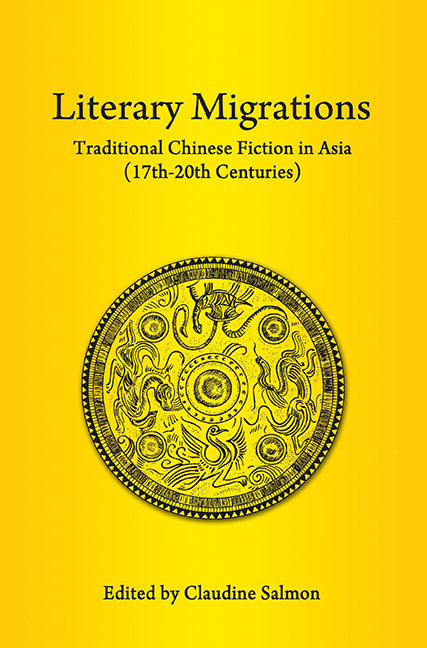Book contents
- Frontmatter
- Contents
- FOREWORD
- Dr Salmon as I Know her
- Preface to Reprint Edition
- Acknowledgements
- INTRODUCTION
- PART I KOREA AND JAPAN
- PART II MAINLAND NORTHEAST ASIA
- PART III MAINLAND SOUTHEAST ASIA
- PART IV INSULAR SOUTHEAST ASIA
- 10 A Note on Javanese Works Derived from Chinese Fiction
- 11 Malay Translations of Chinese Fiction in Indonesia
- 12 Writings in Romanized Malay by the Chinese of Malaya — A Preliminary Inquiry
- 13 Lie Sie Bin Yoe Tee Hoe — Six Malay/Indonesian Translations of a Chinese Tale
- 14 Liang Shanbo yu Zhu Yingtai — A Chinese Folk Romance in Java and Bali
- 15 Translations of Chinese Fiction into Makassarese
- 16 Sam Pek Eng Tay — A Chinese Love Story in Madurese
- 17 Post-war Kung Fu Novels in Indonesia — A Preliminary Survey
- Bibliography
- Author, story-teller and translator index
- Title index
- List of Plates
- Contributors
- Plate section
10 - A Note on Javanese Works Derived from Chinese Fiction
from PART IV - INSULAR SOUTHEAST ASIA
Published online by Cambridge University Press: 21 October 2015
- Frontmatter
- Contents
- FOREWORD
- Dr Salmon as I Know her
- Preface to Reprint Edition
- Acknowledgements
- INTRODUCTION
- PART I KOREA AND JAPAN
- PART II MAINLAND NORTHEAST ASIA
- PART III MAINLAND SOUTHEAST ASIA
- PART IV INSULAR SOUTHEAST ASIA
- 10 A Note on Javanese Works Derived from Chinese Fiction
- 11 Malay Translations of Chinese Fiction in Indonesia
- 12 Writings in Romanized Malay by the Chinese of Malaya — A Preliminary Inquiry
- 13 Lie Sie Bin Yoe Tee Hoe — Six Malay/Indonesian Translations of a Chinese Tale
- 14 Liang Shanbo yu Zhu Yingtai — A Chinese Folk Romance in Java and Bali
- 15 Translations of Chinese Fiction into Makassarese
- 16 Sam Pek Eng Tay — A Chinese Love Story in Madurese
- 17 Post-war Kung Fu Novels in Indonesia — A Preliminary Survey
- Bibliography
- Author, story-teller and translator index
- Title index
- List of Plates
- Contributors
- Plate section
Summary
G. Schlegel and J. Brandes were probably the first Western scholars to have paid attention to the development of Malay and Javanese writings by the Chinese. In a short article published in 1902 Brandes attempted to survey a few Javanese and Malay translations derived from Chinese works. In so doing he pointed out the fact that at least two Javanese translations namely Sam Pek Ing Tae (Liang Shanbo yu Zhu Yingtai, 1873)and Lo Tong (Luo Tong sao bei or “Luo Tong Clears the North”, 1881)had preceded their Malay counterparts which appeared in 1885 and 1884–87 respectively. This assertion is corroborated by the fact that the oldest Javanese translation which has so far been traced (under the title of Li Si Bin)is dated 1858 (see Plate 24), whereas the first in Malay, entitled Koran Giok Lek, did not appear until 1877
Given the paucity of information on the Javanized Peranakan Chinese society, it is rather difficult to provide an outline of the acculturation process of these Chinese families of long standing in Java. We know virtually nothing about the way these descendants of Chinese acquired their knowledge of Javanese Belles-lettres. A brief article by Liem Thian Joe (born in East Java c. 1895, died 1963)says that up to the beginning of this century many Peranakan children, who had been trained in private schools run by Javanese, were familiar with Javanese literature.
We can assume that some of them were simultaneously taught Chinese by private teachers and consequently were also able to read texts written in that language as could Tjoa Tjoe Koan (born in Solo in 1861 and died there in 1905). Tjoa declared in 1901 that since 1877 he had enjoyed reading newspapers in Chinese, in Javanese written with aksara, and in Malay written with Latin or Arabic script. He was much concerned with the progress of the Dutch Indies, as well as with that of the Chinese, and in 1903 he decided to found his own printing-works (Tjoa Tjoe Koan Sien Iem Kiok)and launched successively two papers.
- Type
- Chapter
- Information
- Literary MigrationsTraditional Chinese Fiction in Asia (17th–20th Centuries), pp. 235 - 247Publisher: ISEAS–Yusof Ishak InstitutePrint publication year: 2013



